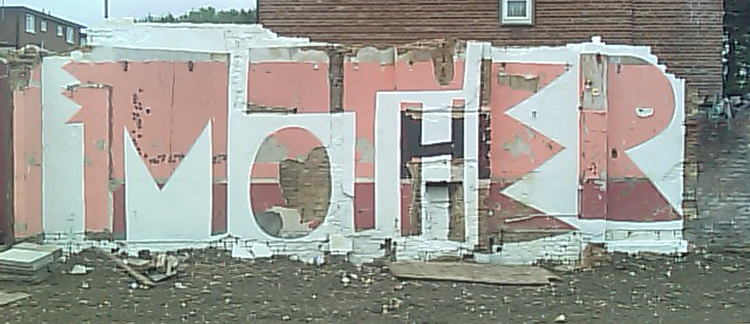The accompanying audio track (one of a number of edits of differing lengths) provides a prose poem, written by me and spoken by an actor, based on a research project about women's experiences of becoming mothers for the first time i. This form of writing, which I call 'rough verse', deviates from the conventions of social science writing in order to communicate research participants' experience in an emotionally replete way. I wrote Mum's over the Moon using data from interviews and observations with one participant, whom I call Juhana. These took place over a period of approximately 16 months, starting soon after her baby's birth. This chronology is represented in the structure of the prose poem and is consistent with the research's focus on becoming and identity transition.
The audio begins with the line 'Mum's over the Moon', a phrase which Juhana used early in the first interview. It immediately places Juhana in the family setting which is so important in her story. In my work, the double attention to setting and affect in accounts of lived experience characterises psycho-social research; that is, research that reduces its perspectives to neither internal- nor external-world forces. To reproduce the vital qualities of voice, Mum's over the Moon is performed by an actor, which also protects the anonymity of the new mother whose story it represents. The actor, Leah Whitaker, studied the audio interview record so that she could imitate, as faithfully as possible, Juhana's phrases, voice rhythms, speech pattern, intonations and accent – in sum, her unique idiom. My unwrought verse (for this is what rough and its cognate term 'raw' mean) was fashioned mainly from Juhana's words, either transcribed directly from the interview audio recording or from being noted down with precision by the observer. I selected passages from a much larger wholeii, and used Juhana's words and phrasing in ways that accentuate the rhythm of her language and the meaning that it helps to convey. I have discussed and demonstrated elsewhere how a 'scenic' understanding (Lorenzer 1986) and presentation helps to unite the personal and the socio-cultural, the past and the present (Hollway and Froggett 2012; Hollway 2011a).
Mum's over the Moon: Rough Verse
http://media.bloomsburymediacloud.org/media/mums-over-the-moon-wendy-hollway
